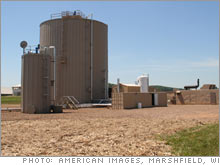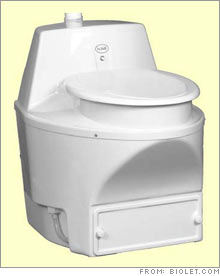|
The scoop on poop
Entrepreneurs say waste need not be wasted.
NEW YORK (FORTUNE) - This is a column about poop: cow manure that can be turned into electricity, "green" baby diapers that can be put in the toilet and waterless urinals that don't flush. Hold your nose if you must, but it turns out that there's money to be made in finding ways to dispose of waste in ways that are cleaner and better for the planet.
A company called Environmental Power Corp., with headquarters in Portsmouth, New Hampshire, operates three methane digesters in Wisconsin that process cow manure into natural gas, which can then be converted to electricity. The company is developing poop-to-power projects in Texas and California, too. Then there's a startup called gDiapers, which sells a "diaper system" with an inner layer that can be safely flushed down the toilet, thereby keeping disposable diapers out of landfills - where 18 to 20 billion are thrown away each year. Finally, a number of U.S., Canadian and European companies are marketing eco-friendly toilets, including some that compost waste, without flushing. The market is growing, albeit slowly, for these no-flush toilets because they save water and reduce pollution. None of these companies will break into the FORTUNE 500 anytime soon, but they are part of a trend that is driving growth at such big firms as General Electric (Charts), Wal-Mart (Charts) and Whole Foods Markets (Charts) - the greening of American business. Environmental Power (Charts) (www.environmentalpower.com) has been around for more than 20 years, experimenting with different forms of renewable energy. But its business has picked up since starting a division called Microgy, which extracts methane-rich gas from animal and food waste. Its technology, licensed from a Danish firm, has operated on a commercial scale in Europe for 20 years; small scale methane digesters have been used since the 19th century. "We see ourselves as gas producers, not unlike a well-driller," says Al Morales, the executive vice president. The difference is, his "wells" don't run dry - a single dairy cow produces about 18 gallons of manure each day. Farmers welcome the technology because it reduces odors and brings them a new revenue stream. One Wisconsin dairy farmer, with 875 cows, has installed a methane digester that produces enough electricity to power about 600 homes, according to Environmental Power. Its Texas facilities will be bigger, and the company has signed a letter of intent with pork processor E.M. Swift to build a digester at a big plant in Nebraska. "We haven't even tapped the swine manure market," Morales says. In 2005, Environmental Power generated about $56 million in revenue and $11 million in operating losses. Gdiapers, a smaller company that launched just last year, currently sells diapers in about 100 supermarkets and natural foods stores in the West, as well as over the Internet. The G in the company's name stands for green and genuine, as well as baby-friendly words like giggle and groovy, according to a spokeswoman for the firm, which is based in Portland, Oregon. The gDiapers consist of an outer layer of washable pants and an inner layer, made of "farmed tree fluff pulp" and a super absorbent material known as SAP, designed to keep babies dry. Flushing the disposable inner layer means that it ends up at a wastewater treatment facility, where sludge is removed (and sometimes used as compost). By contrast, the plastic in disposable diapers can take hundreds of years to decompose in landfills. The average child is diapered 5,000 times before being toilet trained, a University of Minnesota extension service study found. Founders Jason and Kimberly Graham-Nye discovered green diaper technology in Australia when their son was born in 2002; they licensed the idea from its inventor and brought it to the United States, where they have raised $7 million in venture capital, they said. Previously, they pursued varied careers - he was a stockbroker in Japan and taught Japanese, she did AIDS work in Africa, worked at an orphanage in Mexico and ran a telecom startup. "Trying to find work that made meaning and made money was really the key for us," she says. For more about the diapers and the company, visit www.gdiapers.com. No-flush toilets, meanwhile, have been sold mainly for second homes and rural areas where conventional plumbing is unavailable. Now more are selling to environmentalists and advocates of green building who want to save water and waste. In a compost toilet, which is an indoor, high-tech version of an outhouse, accumulated waste is usually collected below ground and aerated until it decomposes into organic matter that can be used as fertilizer. The Chesapeake Bay Foundation in Annapolis, Md., installed a dozen Swedish-made no-flush toilets five years ago; they save on water and sewage bills, and produce a fertilizer that feeds the surrounding landscape. "It's pretty trendy," says Scott Smith, vice president of marketing at Sancor, a Toronto-based firm that sells no-flush toilets. "There are people who buy them to be more environmentally conscious and to get off the grid."
The difficulty is, compost toilets cost considerably more - up to $2,000 - than the standard models available off the shelf at Home Depot (Charts). That's a steep price to pay for going green. |
|



